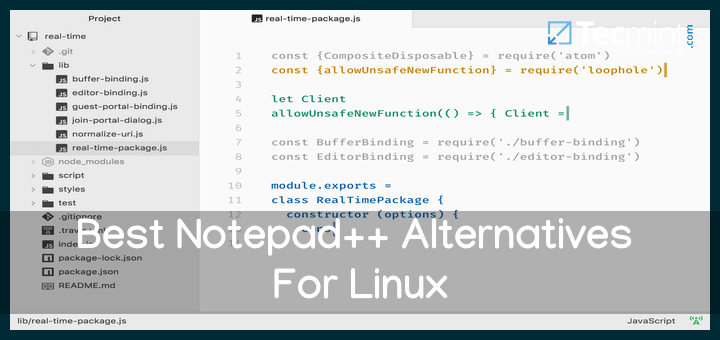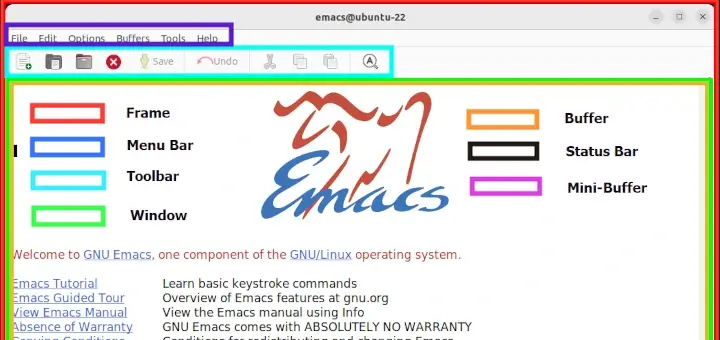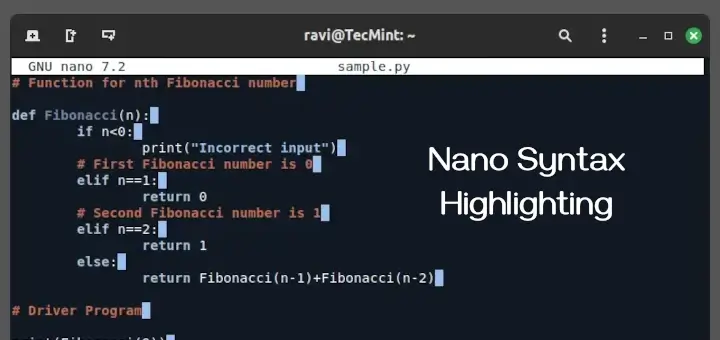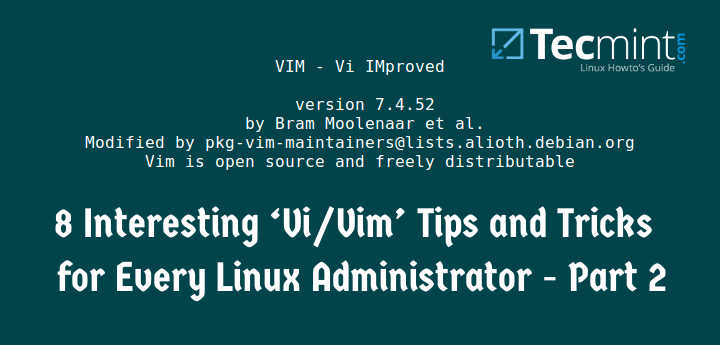While working with Linux systems, there are several areas where you’ll need to use a text editor including programming/scripting, editing configuration/text files, to mention but a few. There are several remarkable text editors you’ll find out there for Linux-based operating systems.
Suggested Read: 12 Best Text Editors for Linux
However, in this article, we will explain to you some of the top reasons why you would consider using Vi/Vim (hereafter referred to as Vim) text editor.
Vi was the first screen-oriented text editor created for Unix, it was designed to be simple yet powerful for text manipulation.
Vim (Vi IMproved) as its name suggests, is a clone of Vi and offers yet more features than Vi. It’s free and open source, designed for use both from a command-line interface and as a standalone application in a graphical user interface (GUI).
It’s highly configurable and comes with notable features such as syntax highlighting, mouse support, graphical versions, visual mode, many new editing commands and a large amount of extension plus much more.
With that said, below are the top reasons why you would consider primarily using Vi/Vim text editor in Linux.
1. Vim is Free and Open Source
Vim is a free and open source software, and it’s released under a license that includes some charityware clauses. The Vim developer, therefore, urges users who like the software to consider donating to underprivileged children in Uganda. The license is compatible with the GNU General Public License.
If you like free and open source software, then this would be one of the first reasons you would consider to start using Vim.
2. Vim is Always Available
Vim is available on most, if not all Linux distributions out there, you can install it from your distro’s official software repositories as follows:
# apt-get install vim [On Debian/Ubuntu] # yum install vim [On RHEL/CentOS] # dnf install vim [Fedora 22+]
3. Vim Is Well Documented
Vim is thoroughly documented, meaning you will find most of the answers to your questions in its help system; from books to extensive help files to an assortment of tips. All you have to do is use the appropriate keywords in your help queries.
Additionally, Vim comes with a useful built-in manual, you can launch it using the :help command once the program is started. This built-in manual contains more information than Vim’s man page.
4. Vim Has A Vibrant Community
Vim also has a community full of energy and enthusiasm, offering remarkable support in terms of developing remarkable plugins, offering useful Vim tricks and tips both for beginners and expert users plus so much more.
5. Vim Is Very Customizable and Extensible
Vim is highly configurable and it has an extensive plugin system, there are lots of good plugins out there which enhance its functionality.
One of the finest collection of plugins we have come across is spf13-vim – The Ultimate Distribution for Vim Editor, which is a cross-platform and highly customizable assortment of vim plugins and various resources for Vim, GVim and MacVim.
6. Vim Has Portable Configurations
Vim’s configurations are portable, this enables you to use the same configs on all your Linux systems. You can as well share configs with friends on the Internet and so on. All you need to to do is copy a few directories and files, and that’s all.
7. Vim Uses Less Amount of System Resources
Vim’s strengths are its smallness and simplicity, therefore it doesn’t consume a considerable amount of system resources as opposed to other text editors especially graphical text editors.
It’s also normally very fast and lightweight even when editing huge files of source code. It’s easy to run over ssh for remote operations on any server.
Furthermore, its offers highly effective key-bindings thus allowing you to carry out any imaginable tasks without lifting your fingers from the keyboard. Even with its simplicity, Vim has many capabilities and is very efficient once learned.
8. Vim Supports All Programming Languages and File Formats
By default, Vim supports several programming languages and file formats. It can detect the type of file that is being edited; this is done by checking the file name and sometimes by inspecting the contents of the file for specific text.
9. Vim is Very Popular in the Linux World
Another reason you would want start using or simply stick with Vim for is that, it is very popular in the Unix/Linux world, especially for system administrators. Two in three experienced Linux system administrators out there will recommend learning Vim.
10. Vim is Fun!
Last but not least, Vim is fun to learn and once you start using it extensively on daily basis. When the initial learning curve is passed, you can really do amazing things with it.
However, you’ll only discover this aspect of Vim once you start learning and using it. Yes, give it a try.
Are you ready to give it a chance, then start learning Vim today. Remember it is not easy (as easy as clicking a button), you must have heard or read some where about the hustles of learning Vim, but the guides provided via these links below should give you a fair start:
- How to Install and Use vi/vim as a Full Text Editor
- Learn Useful ‘Vi/Vim’ Tips and Tricks to Enhance Your Skills – Part 1
- 8 Interesting ‘Vi/Vim’ Tips and Tricks for Every Linux Administrator – Part 2
- How to Enable Syntax Highlighting in ‘Vi/Vim’ Editor
- Make ‘Vi/Vim’ as Bash-IDE Using ‘bash-support’ Plugin
That’s all for now! In this article, we explained to you some of the top reasons why you would consider using Vi/Vim text editor in Linux. Perhaps, these are not the only reasons, do you have any in mind? Let us know via the feedback section below.








You left out three of my reasons.
11. It’s charityware. It’s the only text editor that has built a hospital and an orphanage. If you don’t believe me, start vim and type
:help uganda.12. It’s everywhere. vi-like editors (usually vim) are available on every computer you are likely to use ever. Not only that, but it’s in your shell and your mysql monitor, and your python interpreter. Because the GNU Readline library knows most of the vi’s edit commands. Edit /etc/inputrc and add a line.
and you will be able to recall, edit, and reuse previous commands, correct typos, etc. I do not know why people like GNU Readline’s default Emacs mode.
13. You already know it. Muscle memory. Once you learn to use it how it was designed to be used, its visual edit language becomes the most natural way to use a computer.
And if you don’t know how vi was designed to be used, it will seem cumbersome and clunky and you won’t know why anybody likes it. So it would help if you read about that visual edit language, in Bill Joy’s paper on the subject.
https://docs.freebsd.org/44doc/usd/12.vi/paper.html
11. Ted Bundy, the most famous serial killer actually helped people on suicide hotlines, doesn’t mean he was a good person. This sounds like an ad hominem to me.
12. This sounds like The Procrustean Fallacy. Viruses are everywhere, doesn’t mean I want to catch one.
13. Uh, no I don’t. Seriously? With this argument, you are saying if you don’t already know
viyou should learn it because… Do you already know it? I mean, why do you know it? Because you were forced to learn it.I never learned
viand I refuse to waste any time learning it because, hey, I don’t need to because there are plenty of other much better options out there and easily available (helping to invalidate #12 above even more).Quite frankly I don’t care why it was made. What I know is it is massively cumbersome for 99% of what I do and the other 1% can be accomplished with other simpler modern tools. Use a tool because it makes your life better, not because someone had a great reason to create it in the first place.
Vim is only for those that are good at typing. For people who know well how to use the keyboard, vim is a perfect tool. For the rest of the people, it is simply impossible to use vim. Nano instead (and any other typical editor I have tested, such as gedit or Geany) is much less powerful to deal with huge files.
The test: to open and manage a file with the number 7^(7^7) (with all its integer digits) written on it. Nano does not crash, but suffers too much to deal with that file. Gedit crashes and makes the computer crash. Vim does not fail. What is more, vim works as well as if the file was one of a simple 100 B text.
I have NEVER, in my nearly 25 years of web development and server administration, seen a way vi can be better than something simple like nano. I guess if you are a super power user nerd who wants to customize your editor (of thousands of IT people I have worked with NONE of them has bothered to do this) it can be helpful.
If editing massively large files it could be helpful but I just use easier tools like sed, awk and grep. And fun? Are you insane? The last thing I want to do is have to spend 6 months learning all the absurd finger acrobatics required to do something as simple as change a typo.
Personally I think all the vi users love it only because they are trying to justify all the time they sank into learning the over-engineered tool and because they like the elitist feeling they get from knowing something massively complex (even though that complexity has no practical value).
Personally I find it sad that this is the best you can do in providing a top 10 reasons to use the tool.
Vi or Vim is definitely useful on servers. Basically almost every distro has vi or vim preinstalled.
A last it can be found in default repositories. It is small and powerful but definitely not simple to use and learn. I’m quite efficient in terms of using vim yet I see no pint of using it on desktop system nowadays.
Written like a true Vi/Vim masochist. The command structure of Vim has not changed since the editor was created. It is still as esoteric and byzantine. Using vi/vim is like hitting yourself with a hammer, it feels So good when you stop.
Even programming in Assembler does not approach the tedium of vi/vim. However, I will admit that, like Assembler, vi/vim gives the user a much finer control. But, in today’s computer world, there are much easier to use products that are just as effective as vi/vim and Assembler.
The same ten points can be made about nano.
@dragonmouth
I agree with you, Vi/Vim is not easy to learn, but it has some upsides as well, especially when you dedicate time (i know life is too short) to learn it. Many thanks for sharing your thoughts with us.
OMG, I am dying with laughter here. Very well and accurately said. Vi needs to die.
When I try to print the page on my tablet using Chrome browser the stupid sliding bar on the side overwrites the top of each page. Please have something added to turn it off!!!
@James
Have you tried using another browser, this could be a Chrome browser problem.